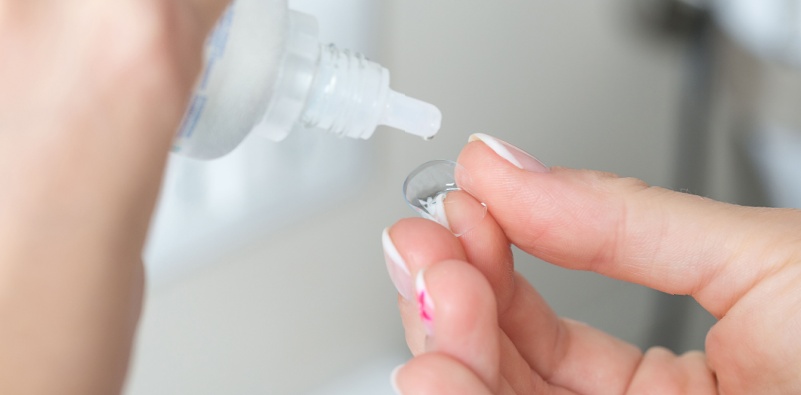How To Care For Your Contact Lenses
Contact lenses can be a fantastic alternative to glasses, offering convenience, a panoramic field of vision, and the freedom to engage in various activities without worrying about frames obscuring your vision or getting in the way. However, with this convenience comes responsibility. Knowing how to care for your contact lenses is essential not only for the longevity of the lenses but also for maintaining the health of your eyes.
Dr. Kvitle explores why taking care of your contact lenses is so important here and provides you with the best tips and tricks to keep both your lenses and your eyes in top shape.
Why is caring for your contact lenses important?

Whether you wear contact lenses daily or just occasionally, proper hygiene and contact lens care are crucial. Failing to take care of your contact lenses can lead to a range of eye problems, from minor irritations to potentially severe infections. The primary concern is the build-up of bacteria and other harmful microorganisms on the lenses.
Specifically, these can lead to infections like keratitis, which is an inflammation of the cornea, or conjunctivitis, commonly known as pink eye. Such infections can be painful and may even cause long-term damage to your vision if not treated promptly. If you start experiencing symptoms like a burning, painful or gritty feeling in your eyes, itching, swelling, redness, blurry vision, watery eyes, discharge or light sensitivity, an infection caused by poor contact lens hygiene may be the cause.
By following proper contact lens care routines, you can significantly reduce the risk of these issues occurring and keep your eyes healthy so your lenses continue to provide clear and comfortable vision.
The best tips for contact lens hygiene

Taking care of your contact lenses doesn’t have to be complicated. With a few simple practices, you can keep your lenses clean and your eyes happy. Here are our top tips:
1. Wash your hands before handling your lenses
Before you insert or remove your contact lenses, always wash your hands with soap and water. Make sure to dry them thoroughly with a clean towel too. Clean hands prevent the transfer of dirt, oils, and bacteria from your fingers to your lenses. We recommend avoiding using oily or scented soaps, as these can leave a residue on your hands that might transfer to the lenses.
2. Never rinse or store contacts in water
Water, whether tap or sterile, should never be used to rinse or store your contact lenses. This is because water can contain bacteria and other microorganisms that are harmful to your eyes. Additionally, water doesn’t have the same disinfecting properties as contact lens solution, meaning it can’t properly clean your lenses. Always use a sterile contact lens solution designed specifically for cleaning and storing lenses.

3. Use fresh solution every time
Each time you clean and disinfect your contact lenses, be sure to use fresh solution from the bottle. Reusing old solution that you’ve already cleaned your lenses or case with can lead to contamination as it may no longer effectively disinfect your lenses. We suggest making it a habit to discard the old solution from your lens case, rinse the case with fresh solution (not water), and then fill it with new solution before storing your lenses.
4. Keep your contact lens case clean
Your contact lens case can become a breeding ground for bacteria if not properly cleaned. Similar to your daily routine, make sure to regularly rinse the case, inside and out, when you’re not using it to store your lenses. Use fresh contact lens solution, not water, and then leave it to air dry with the caps off. Replace your contact lens case at least every three months to ensure it stays clean.

5. Stick to the recommended wear time
Every type of contact lens has a recommended wear time, whether daily, weekly, or monthly. It’s important to follow these guidelines and not overextend the use of your lenses, as overwearing lenses can lead to discomfort, dryness, and an increased risk of infection. If you’re using daily disposable lenses, make sure to discard them after you’re done with the day. For weekly or monthly lenses, keep track of when they need to be replaced to avoid wearing them for too long.
6. Don’t sleep in your contacts
Sleeping in your contact lenses can deprive your eyes of oxygen and increase the risk of infection. The only exception to this rule is Ortho-K lenses, which are designed to be worn overnight to temporarily reshape the cornea. For all other types of lenses, make sure to remove them before bed to give your eyes a chance to breathe and stay healthy.
Schedule your contact lens aftercare appointment
We hope you found our contact lens care tips useful!
The first step in caring for your eyes if you wear contact lenses is booking a follow-up appointment with Dr. Jason Kvitle for your contact lens aftercare. This is a great opportunity to ask for any further advice or guidance you may need about caring for your lenses.
Dr. Kvitle will also check the health of your eyes and assess how well they’re adjusting to the contact lenses. He will also be able to see if you need to try out another type of lens or if your prescription needs updating.
We encourage you to book your next contact lens appointment with Dr. Jason Kvitle today if you know you haven’t been seen in a while.
 1107 College Ave Quincy, IL 62301
1107 College Ave Quincy, IL 62301


